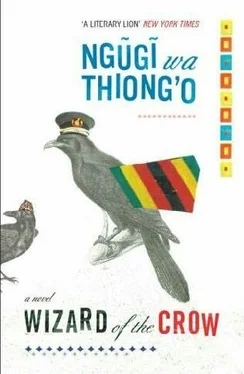“But did you learn how to make good curry?” Tajirika asked, unaware of how he was torturing Kamltl with this talk about food. “Here they don’t let us into their houses.”
“Well, survival skills,” Kamltl said vaguely, trying to veer away from the subject.
“Mhh! So you are highly educated?” Tajirika muttered, scrutinizing the certificate.
“Just trying to give myself a chance,” Kamltl replied with a hint of modesty, but not displeased with hearing an appreciation of his achievements.
“You must have read the Karma Sutra cover to cover?”
“What is that?” Kamltl asked, genuinely puzzled, because he had never read this ancient manual of lovemaking.
“And gave yourself a chance to put it into practice?” Tajirika said, taking his eyes off the papers.
He glanced at his secretary in an unconvincing attempt at an apology, as if he had just realized that he had said something he should not have said in front of her; but the glance also seemed to say that he had much more he would have liked to ask had she not been present.
Tajirika glanced at the secretary again and laughed rather uneasily. He had not yet figured her out, and he felt her judgment even in her silence. He dropped the subject of the Karma Sutra and went back to the certificates.
“India? Madras?” Tajirika continued as if genuinely interested in the man’s educational achievements. “Tamil Nadu! And what is this? Another Indian curry?”
“No,” Kamltl answered, not knowing whether or not he should laugh, and began to patiently explain. “India is divided into many regions just like Aburlria is divided into several provinces. Tamil Nadu is the name of a state in southeastern India. Kerala is another southern state, but on the western side. So both have a common border. Tamil Nadu also neighbors two other states on its northern side: Karnataka and Andhra Pradesh. Pradesh means the same thing as province. But really, Indian provinces are like countries. Madras- but I think they now call it something else… Chennai, yes, something like that-Madras was…”
“I asked you to tell me about your education, young man, and you give me a whole lecture on Indian geography?”
“I am sorry,” Kamltl said. “India is rich in geography and history.”
“Like that of the Black Hole of Calcutta?” Tajirika remarked with a self-satisfied grin. “That is the only history of India that I know, and I don’t really want to know more. If my advice were sought as to what should be done with the Indians of Aburiria, I would say that they should all be cast into the Modern Black Hole of Calcutta. Whenever a black man in Aburiria tries to raise himself up, there is an Indian in his way. And when he deals with a black man, it is nothing but insults. They have no respect for the people on whose soil they have prospered. And where do they take their money? To India, Pakistan, and now Bangladesh. No loyalty to Aburiria. Some have even refused to take up our citizenship. They prefer to remain British, actually English. And the others, with dual citizenship, are always ready to take flight should things ever go wrong in Aburiria. The Indian should count his blessings one by one that we have a ruler like the Buler.”
“But don’t some black Aburlrians also spirit their money to Swiss bank accounts?” Kamltl asked. “What is the difference?”
“Why are you defending the Indian?”
“I am only saying that obviously in India, as in Aburiria and throughout Africa, there are greedy people. But there are also others who care and who struggle against whatever harms human life. My opinion is that there are many things we could learn from India and other Asian countries, just as they have much to learn from us. We in Aburiria, more than others, should strengthen our ties with India because some of our citizens are of Indian origin…”
“You dare call Indians here citizens? Aburlrian citizens?”
“Why not?” Kamltl thought his prospective boss was trying to see if he could stand his ground with customers. He added, as if revealing a secret to the boss, while appealing to his Pan-Africanist sentiments, “You know, it is thought by some that some Indians are of African descent-the Siddis, for instance. The Dravidians, who speak Tel-ugu, they look like they came from Ethiopia or Egypt. Historians talk of an African general named Malik Ambar, who…”
“Buled India?” Tajirika completed the sentence mockingly.
“Yes,” said Kamltl enthusiastically, “but not all India. You see, in the sixteenth century or thereabouts, India was not one…”
“So you also studied the art of telling lies?” Tajirika interrupted with a burst of laughter, winking at the secretary as if to say, You have heard him for yourself. “Or are you merely adding a little salt and pepper to your tales?”
“I am not lying; it is just a hypothesis,” Kamltl said as he tried to steer the conversation away from the African presence in India. “Even if we put aside questions of origins and citizenship, India and Indians did play a role in the struggle for African independence. Quite a few joined with Africans to oust colonialism. And Mahatma Gandhi-wasn’t it only after fifteen years of anticolonial struggles in South Africa that he went back to India to organize Satyagraha and ahimsa against British rule in India? There is beauty in the man clad in calico and sandals, armed with nothing but a walking stick and his creed of nonviolence, taking on the might of the British Empire, don’t you think?”
“There, now you see my point?” Tajirika said. “He lights a fire in South Africa and what does he do? Buns away when the going gets rough and leaves others to put it out or burn in it. Young man, you have learned quite a lot of propaganda in India. So what else apart from Gandhi’s propaganda and the Nehrus’ monopoly of power did you learn?”
“Let’s say I learned that there is not much difference between the political character of the Indian and the African. There are some who love their history and their skin color and there are others who hate their history and their skin color…”
“There you go again! I asked you what else you learned in India and you answer by telling me about skin color?” Tajirika said sternly, angrily.
Even the secretary was surprised by what she saw as an overreac-tion, almost as if he had taken the reference to skin color as a personal affront.
Kamltl, who had been trying to impress a prospective boss with his depth and breadth of knowledge, was now not sure where all this talk was leading or what Tajirika really wanted, for each time he tried to demonstrate his education, he heard only barely veiled mockery and now anger from him. What was the difference between Tajirika’s abuse and what rich Indians were alleged to dole out to black Aburlri-ans? Kamltl realized that he needed to be brief and precise in answers without worrying about implications. At the same time he did not want to leave the premises jobless and so felt driven to display his learning so as not to give any impression of shortcomings in his education. People in Aburiria said bad things about Indian education, some even claiming that Indian degrees can be bought in the marketplace, and he did not want to leave the impression that he himself had one day walked the length of Mount Road into George Town, Chennai, bargaining for the cheapest set of certificates.
“Well,” Kamltl continued, with forced enthusiasm, “as I was saying, in India one can learn a lot. I even took an extra elective, herbol-ogy the study of the medicinal properties of plants. I can assure you, sir, that there is no aspect of plants, roots, leaves, or barks that I have not looked into; and if I had the money I would undertake more research into the varieties of plants in Aburiria with a view to discovering and documenting their medicinal properties, but even without formal research…”
Читать дальше












